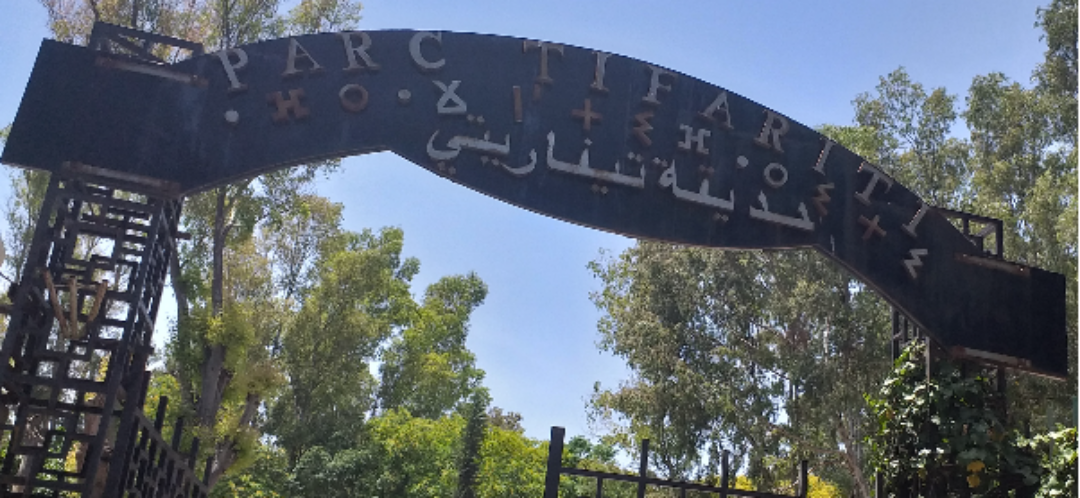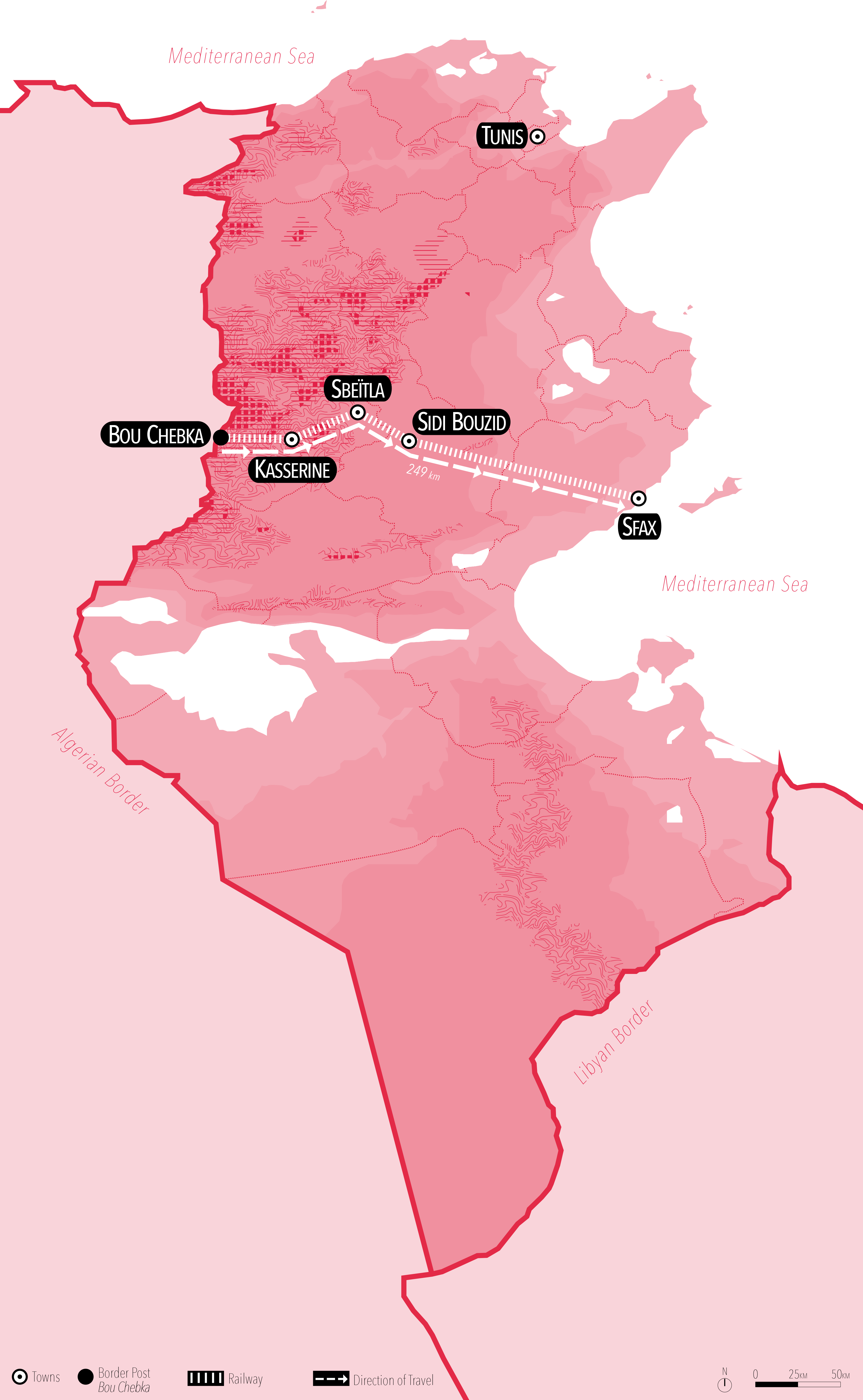“Come my friend. Come rest” – a seemingly inviting call, resonating with warmth and reassurance, yet concealing a dark truth. This friendly-sounding phrase was overheard by our journalist, Eléonore Plé, during the summer of 2023. The dangers particularly affecting sub-Saharan African people in exile reveal themselves on the tracks of the train line that winds its way from Algeria to Tunisia in the Tunisian Kasserine region, where men wait for migrants who’ve just crossed the border.
By Méline Laffabry (edited by Şebnem Adıyaman)
When migrants reach Kasserine, they embark on the final leg of a journey often spanning several years. Many of them recount the warm welcome extended to them by a portion of the local population. Journalist Eléonore Plé witnessed around 20 residents emerging from their homes and rushing towards migrant groups to provide them with food, water, and shoes. However, things do not always go as smoothly.
For those who answer the call of the men along the railway, reality proves to be far from welcoming. Our journalist vividly recalls a tense atmosphere during her observation. While she was on the side of the rails in the dark of the night, she noticed that the men waiting for the migrants kept looking at her, suggesting that her presence was causing discomfort or agitation.
Plé spoke with three migrants aged 18, 25, and 30, who had fallen victim to the threats of this spot. Recounting their harrowing experiences, one described a vicious attack by ten assailants armed with machetes and slingshots. “Ten of them came and attacked us. My friend was badly hurt, bleeding from the head, and they took everything we had. We tried to fight back but they were too many and had machetes and slingshots”. Such assaults on migrants, especially those from sub-Saharan regions, have become alarmingly frequent in Tunisia.
From poverty to dream
Kasserine is a governorate (or province) located in central-western Tunisia. It is known for its strategic location, as it serves as a gateway between Tunisia and Algeria. The region is characterised by its rugged terrain, with mountainous landscapes and valleys, making it both picturesque and challenging to traverse.
Economically, Kasserine has faced significant challenges, with high levels of unemployment and poverty affecting its population. This economic hardship has contributed to social tensions and created an environment where illegal activities such as smuggling can thrive as means of survival for some individuals.
Moreover, Kasserine’s strategic location has made it a crucial transit point for migrants and refugees. Less than 300 km away from Sfax, where migrants embark on boats to reach Europe, the region serves as a gateway for individuals wanting to cross the Mediterranean, adding layers of risks, dreams, and desperation to its already intricate socio-economic fabric.
In February 2023, Tunisian President Kaïs Saïed made controversial remarks suggesting a conspiracy involving migrants from sub-Saharan Africa. He insinuated that their influx aimed to alter Tunisia’s demographic landscape and undermine its Arab-Islamic identity. “There exists a criminal plan to change the demographic composition of Tunisia, and certain individuals have received large sums of money to grant residence to sub-Saharan migrants,” stated the head of state, as quoted in a presidential communiqué.
“This discourse has exacerbated a wave of violence (…) from Tunisian citizens who have violently attacked black migrants, and it has also sparked waves of arbitrary arrests,” explained Salsabil Chellali, director of the Human Rights Watch office in Tunis, in an interview with the French daily Le Monde. These statements sparked outrage both domestically and internationally, escalating racially-charged tensions and triggering violent acts against black migrants. Human rights organisations condemned the inflammatory rhetoric, highlighting its role in stoking xenophobia and violence. Saïed’s remarks underscored the challenges of migration and identity facing Tunisia, while also prompting broader discussions on racism and discrimination within the country.
Perfect conditions for exploitation
These circumstances have facilitated the emergence of a scheme to exploit the journey of individuals in exile. Some local inhabitants take advantage of migrants arriving in the region by tracing their path along the rails from Algeria. Under the guise of hospitality, the men awaiting the migrants present themselves as friendly locals offering assistance with the inviting phrase, “Come my friend. Come rest.” with the aim of luring them aside in order to strip them of their belongings.
Plé’s investigative efforts extended over a three-week period in Tunisia, where she meticulously traced the path migrants take upon entering the country until their departure by sea. Throughout her inquiry, she gathered and verified numerous testimonies from migrants who had been attacked in the Kasserine region, shedding further light on the perilous conditions faced by those on this arduous journey.
This article is part of a the multimedia series “Tunisia, land of Passage”, a project in collaboration with Specto Média. Each Tuesday, during six weeks, we will publish a podcast episode, a contextualisation article, a profile and an infography.
Listen to episode 1 below or click here.
This article is part of the special series “Tunisia – Land of Passage”, produced by Specto Media and aidóni. Listen to the podcast here.
This multimedia series is produced by Specto Média.
Author: Eléonore Plé
Investigation and production: Eléonore Plé
Sound production: Norma Suzanne
Graphic identity: Amandine Beghoul and Baptiste Cazaubon
French version dubbing: Yamane Mousli
English version dubbing: Isobel Coen and Julian Cola
Editing: Hugo Sterchi and Norma Suzanne
Recording studio: Radio M’S
To discover the series in French, visit Specto Media

This multimedia series is produced by Specto Média.
Author: Eléonore Plé
Investigation and production: Eléonore Plé
Sound production: Norma Suzanne
Graphic identity: Amandine Beghoul and Baptiste Cazaubon
French version dubbing: Yamane Mousli
English version dubbing: Isobel Coen and Julian Cola
Editing: Hugo Sterchi and Norma Suzanne
Recording studio: Radio M’S
To discover the series in French, visit Specto Media











